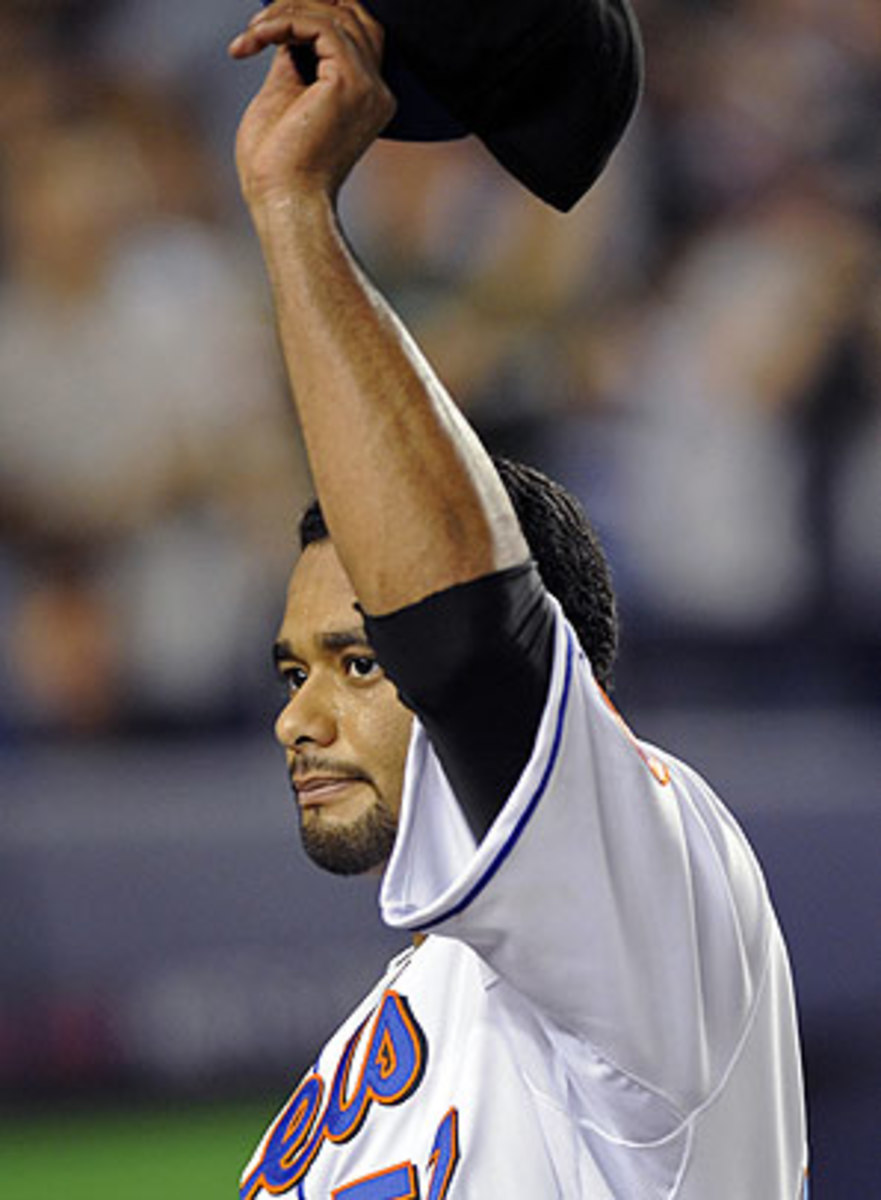
Mets still in front, but doubts remain about playoff chances
Like death, like taxes, like the fact that Rudy Giuliani's next speech will be largely self-congratulatory, a late season collapse by the Mets has come to be viewed as something of a certainty among New Yorkers. Even as the Mets surged under new manager Jerry Manuel, from one game under .500 (34-35) when he replaced Willie Randolph on June 17 to 18 games over .500 (79-61) through Thursday -- and from 6.5 games back in the NL East standings to three games in front -- they were never spoken of as the juggernaut that those numbers suggested they had become. In other cities, with other teams, the refrain might have been, "Can't wait 'til October!" In New York, with the Mets, it was, "Just wait 'til September."
September has arrived, and heading into Sunday night's finale of a critical three-game series against the Phillies, a collapse, or at least the beginnings of one, appeared imminent. Philadelphia starters Brett Myers and Jamie Moyer had thoroughly dominated Mets hitters in the series' first two games, and a third loss would have been as devastating as it was unsurprising, in that it would have allowed the Phillies to move into a first-place tie with New York.
It also would have further focused the spotlight on problems that have been there all along. The Mets' offense may indeed be too inconsistent, amassing in the first half of Sunday's doubleheader a pair of infield singles against a man (Moyer) who will turn 46 in two months. Carlos Delgado can't, in fact, drive in a run every day, as he seems to have been doing since June. The Mets, despite Manuel's best efforts, still sometimes seems to have trouble summoning much fire when it needs it most, as it did last season when it lost 12 of its final 17 games and missed the playoffs entirely, after holding a 7-game divisional lead on September 12.
Last year, though, the Mets didn't have Johan Santana. "Anytime his turn comes around," says Manuel, "we feel confident that he can keep us going, or stop us from going the other way." The latter task was Santana's on Sunday night, and he came through with a 116-pitch performance that was effective, if not magnificent. He allowed two runs and five hits over seven and a third innings, and capably handled every Phillies batter save Ryan Howard, who drove in both runs and crushed a home run into the leftfield bleachers in the third.
Santana and Delgado, who hit two mammoth bombs to right off of Cole Hamels and finished with four RBI (raising his season total to 100) and chants of "M-V-P" ringing in his ears, led the Mets to a 6-3 win that was as important psychologically as it was in the standings. "We had to win a game, even though we would still have been a first place team going down the stretch," said Manuel afterwards. "We needed to show that we can get off the deck, come back and win a game."
That the Mets did, and they're now in the far preferable situation of entering the season's final 19 games with a two-game cushion in the NL East, rather than essentially having to start a 19-game season from scratch. They also succeeded in tamping down all that collapse talk, at least for a few days, but certain warning signs still remain. Jose Reyes, the igniter of the offense when he's at his best, went 0-for-13 in the series, calling to mind his performance last September, during which he hit .205. David Wright admitted on Sunday that he's recently found himself pressing a bit with runners in scoring position -- he's hitting .238 in such situations. And Sunday also brought the news that the Mets will likely be without All-Star closer Billy Wagner for the remainder of the season, due to pain in his pitching elbow. While Luis Ayala has converted five of his six save opportunities as Wagner's replacement since arriving from Washington in a mid-August trade, his ERA stands at 5.32, and with 43 strikeouts in 67.2 innings he's not exactly lights-out.
Even so, the Mets have now seen the last of the Phillies, at least for the regular season, and now have the easier task of finishing the season mostly against the rest of the NL East -- 15 of their final 19 games will be played against the Nationals, the Marlins, and the Braves. Of course, it should be an easier task. Last year the Mets dropped five of their final six games against the lowly Nats and Marlins, with another loss to the Cardinals in between. (The Phillies also have 15 games remaining against NL East foes, on whom they beat up last September). After Sunday night's game, with several dozen reporters surrounding his locker, Delgado -- who has been carrying the Mets' offense, even as some of his co-stars slump -- didn't express any concern. "We think we're the team to beat," he said. "We think that what happened last year is not going to happen again... It's definitely a different atmosphere here, a different feeling than what it was last year."
As Delgado spoke, a distinct spraying sound, much like that produced by a shaken bottle of champagne, reverberated through the Mets' clubhouse. A quick glance into the team's adjacent bathroom revealed the source to be an aerosol can of deodorant, being very liberally applied by a player who shall remain nameless here out of respect for the sanctity of his personal hygienic habits. It's not Veuve time yet -- not even close, as the Mets know better than anyone. But the Mets' victory on Sunday, in what was their most important game of the season so far, suggested that Shea Stadium's home clubhouse might yet play host to the champagne celebration for which it was prepared so many times in 2007, and which never happened.





